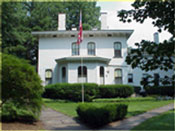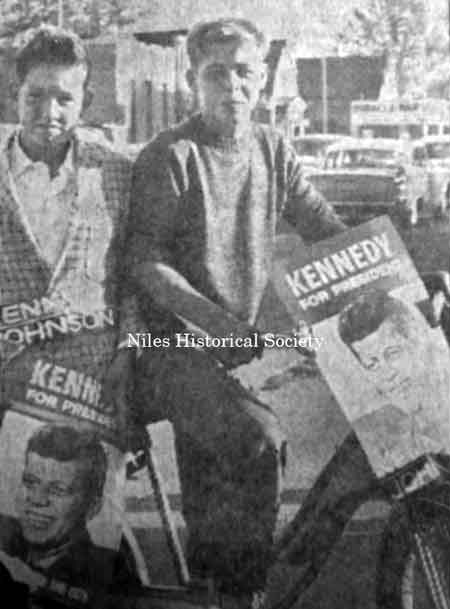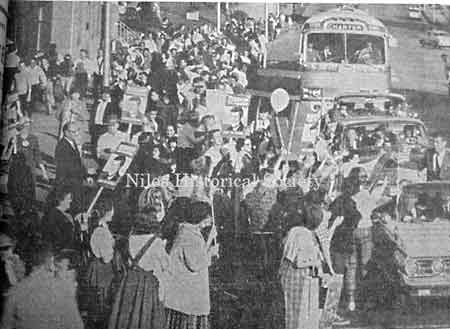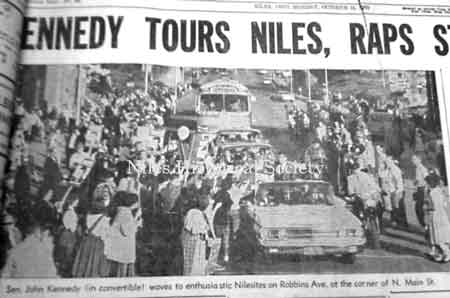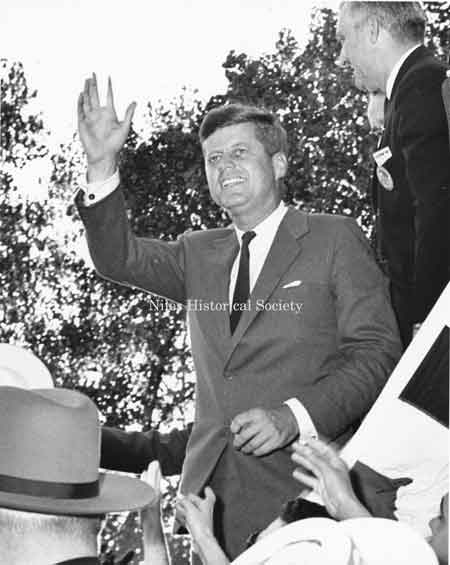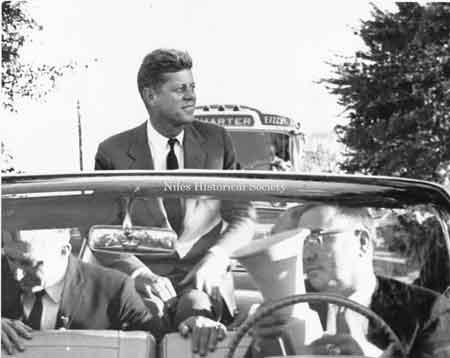Ward-Thomas Museum


John F. Kennedy Visits Niles
Ward — Thomas
Museum
Home of the Niles Historical Society
503 Brown Street Niles, Ohio 44446
Click here to become a Niles Historical Society Member or to renew your membership
Click on any photograph to view a larger image.
News
Tours
Individual Membership: $20.00
Family Membership: $30.00
Patron Membership: $50.00
Business Membership: $100.00
Lifetime Membership: $500.00
Corporate Membership:
Call 330.544.2143
Do you love the history of Niles, Ohio and want to preserve that history and memories of events for future generations?
As a 501(c)3 non-profit organization, your donation is tax deductible. When you click on the Donate Button, you will be taken to a secure Website where your donation will entered and a receipt generated.
The boy on the left is Robert Porter Jr. who lived at 123 Highland Avenue and the boy on the right is Merle Fick who lived on Chestnut Street. They display their Kennedy posters as they pose for a picture where Haydu’s gas station now stands at the intersection of Robbins Avenue and North Main Street. Taken from Niles Daily Times, October 10, 1960. Photograph: Ken Williams |
Presidential Candidate, Jack Kennedy, Visits Niles, Ohio on October 15, 1960. Enthusiastic Nilesites lined Robbins Avenue and Main Street hoping to catch a glimpse of JFK as the motorcade progressed past the crowded throng. After the speech in Youngstown, on his way to deliver an address in Warren, Senator John F. Kennedy's motorcade proceeded through McKinley Heights. It was a sunny, warm afternoon, October 9, 1960. An 11 year old boy and his uncle Richard, made their way down Rt. 422 to try to catch a glimpse of the Presidential hopeful. (This was a pretty big deal for McKinley Heights. Matter of fact, the last “big” thing to happen here was when Larry Fine of the Three Stooges stayed a night at the Villa Arms Motel). As the little boy and his uncle patiently stood in front of Tommy Mohn's Sohio service station, across from Handy Andy's restaurant, JFK came into view. Riding in a convertible, he was standing up, waving to people lining the route. As his motorcade slowly turned left onto Robbins Avenue heading toward Niles, the lead Secret Service car abruptly came to stop and so did Kennedy’s - right smack-dab in front of the boy and his uncle. They were stunned! Kennedy was waving to the crowd on the opposite side of the road, but he suddenly whirled around and appeared quite startled when the boy and his uncle shouted, "Hello, Mr. President!" Kennedy, looking straight at them, flashed that patented toothy-grin and held out his hand. But just as the little boy and his uncle approached the car to shake Kennedy’s hand, the driver hit the accelerator and off they went, down Robbins Avenue. He waved as the car sped out of sight. It was a close-encounter with a man who was a mere month away from being elected President of the United States, but more than 50 years later, it is something this boy will never forget.—Ed Byers |
|
|
|
||
Local Newspaper Images of JFK Motorcade Traveling Through Niles. From the Daily Times article by
Walter Wick come the following excerpts- |
||
|
JFK waves to bystanders as |
John
Fitzgerald Kennedy was the thirty-fifth President of the United
States. He was born on May 29, 1917, in Brookline, Massachusetts.
He attended both public and private schools before enrolling in
Princeton University in 1935. Kennedy transferred to Harvard University
the next year. He graduated from Harvard in 1940. He attended graduate
school at Stanford University from 1940 to 1941. Kennedy left school
and enlisted in the United States Navy at the beginning of World
War II. He rose from the rank of seaman to lieutenant during his
four years in the Navy.
Receiving an honorable discharge at the end of the war, Kennedy worked briefly as a newspaper reporter. In 1946, he began a political career and was elected to the United States House of Representatives as a representative from Massachusetts as a member of the Democratic Party. He served as a representative from 1947 to 1952, when he was elected to the United States Senate. He was reelected in 1958. In 1956, he achieved national recognition when his book Profiles in Courage which won the Pulitzer Prize for biography. In 1960, Kennedy was elected President of the United States. He defeated Republican Richard Milhous Nixon in one of the closest presidential elections in United States history. Kennedy won the popular vote with just over 100,000 votes of more than sixty-eight million votes cast. Kennedy was the first man born in the twentieth century to be elected President. In the election of 1960, Ohioans favored Nixon over Kennedy. Nixon won Ohio by 273,363 votes, the largest plurality for Nixon in any state. The Republican Party also gained firm control over both houses of the Ohio legislature in this election. As president, Kennedy sought to create new opportunity for the U.S. public. His domestic agenda became known as the New Frontier. Kennedy supported increased funding for education, improvements in civil rights and federal funds to help revitalize cities. The United States Congress refused to enact some of his proposals. Congress did approve the Peace Corps, where volunteers from the U.S. would assist in developing better living conditions in foreign countries. At Kennedy's urging, the Congress did authorize funding to attempt to place a man on the Moon by the end of the 1960s. The Cold War dominated Kennedy's foreign policy. Kennedy increased the number of U.S. advisers in South Vietnam. He also approved the Bay of Pigs Invasion, an attempt by exiled Cubans to overthrow Cuba's communist dictator, Fidel Castro. Kennedy succeeded in preventing the Soviet Union from placing nuclear missiles in Cuba in 1962, in what became known as the Cuban Missile Crisis. He also negotiated a treaty with the Soviet Union that outlawed the testing of nuclear warheads in outer space. When Kennedy visited Dallas, Texas, on November 22, 1963, he was killed by an assassin named Lee Harvey Oswald. While Kennedy had faced some opposition as president, his untimely death made him one of the more revered presidents in U.S. history. Credit:Ohio Central History Connection: https://ohiohistorycentral.org/w/John_F._Kennedy |
|
| |
||
